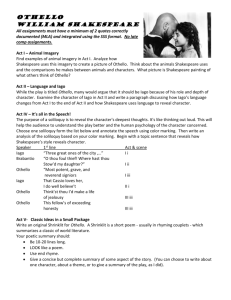

” Further dramatic irony conveys Othello’s suffering at the hand of circumstance. Othello is subtly manipulated by Iago “I hope you will consider what is spoke comes from my love” while slowly planting seeds of jealousy within Othello “beware my lord of jealousy.
#Without a prompter othello full#
” Shakespeare makes frequent use of dramatic irony “Honest Iago” “And for I know thou’rt full of love and honesty. Iago perceives Othello’s noble qualities “The Moor (howbeit that I endure him not), is of a constant, loving, noble nature” yet his selfish nature drives him “In following him, I follow but myself. Iago’s hatred “I follow him to serve my turn upon him” is out of Othello’s control. Shakespeare uses Iago’s jealousy as an example of circumstance acting against Othello.

” Because of his tragic pride, Othello becomes a willing victim to circumstance. “that dost almost persuade justice to break her sword. “Yet she must die else she betray more men” demonstrates that he is acting out of what he believes to be justice, for the salvation of pride. Shakespeare uses this soliloquy to accentuate “A fine woman, a fair woman, a sweet woman” placed beside “let her rot and perish, and be damned tonight” and further contrasted with “the world hath not a sweeter creature” demonstrates Othello’s inner conflict.įinally, Othello’s pride overcomes him “I will chop her into messes: cuckold me? ” Othello’s pride is once again revealed in the soliloquy prior to Desdemona’s death. Through the juxtaposition of contrasting images, Shakespeare shows the audience Othello’s inner struggle. Othello is inwardly torn between his suspicions of Desdemona and his love for her. Iago’s ironic comments “beware my lord of jealousy” “that cuckold lives in bliss, who certain of his fate, loves not his wronger” play on Othello’s pride and love for his wife. Othello’s state of hate and jealousy comes from his overwhelming pride, as this is the root of his jealousy.

” His trust however, is not Othello’s tragic flaw. ” “to abuse Othello’s ears that he is too familiar with his wife” and due to his trust, Othello continues to believe Iago “I think thought dost: and for I know thou’rt full of love and honesty. Shakespeare takes advantage of Othello’s trust, “That thinks men honest that but seem to be so” through Iago.ĭramatic irony is used to foreshadow the imminent disaster, as the audience is made aware of Iago’s intentions through soliloquy “I hate the moor. Othello’s trust “my life upon her faith” “good Iago” “honest Iago” is also shown through Desdemona “and but my noble moor is true of mind, and made of no such baseness as jealous creatures are” However, despite his high standing and moral, trusting nature, Othello has a tragic flaw in his character. Shakespeare not only shows us Othello’s high social standing, but also his moral nature and character.

clearly indicating that Othello is respected. Shakespeare also demonstrates Othello’s high standing through other characters “Valiant Othello, we must straight employ you,” “your son-in-law is far more fair than black. Through dialogue and confrontation, Shakespeare shows the audience Othello’s character “My parts, my title and my perfect soul” “keep up your bright swords for the due will rust them” and “were it my cue to fight I would know it without a prompter” are all indicative of Othello’s confidence and standing within society. Shakespeare shows him as being successful and respected. Othello clearly has a position of power in the Venetian society. Through Othello’s position of eminence, his tragic flaw and tragic circumstance, and finally the catharsis of pity and fear, Shakespeare’s Othello is a tragedy. Shakespeare creates an accumulation of fear and pity, through the harsh deception of Othello, and catharsis occurs when Othello is released from this situation through his death. Othello’s position of eminence accentuates his eventual downfall, and his tragic flaw is essential in both the circumstances created and in the resulting catharsis. Othello’s character, circumstance and the eventual catharsis of fear and pity are the qualities that make Othello a tragedy.


 0 kommentar(er)
0 kommentar(er)
